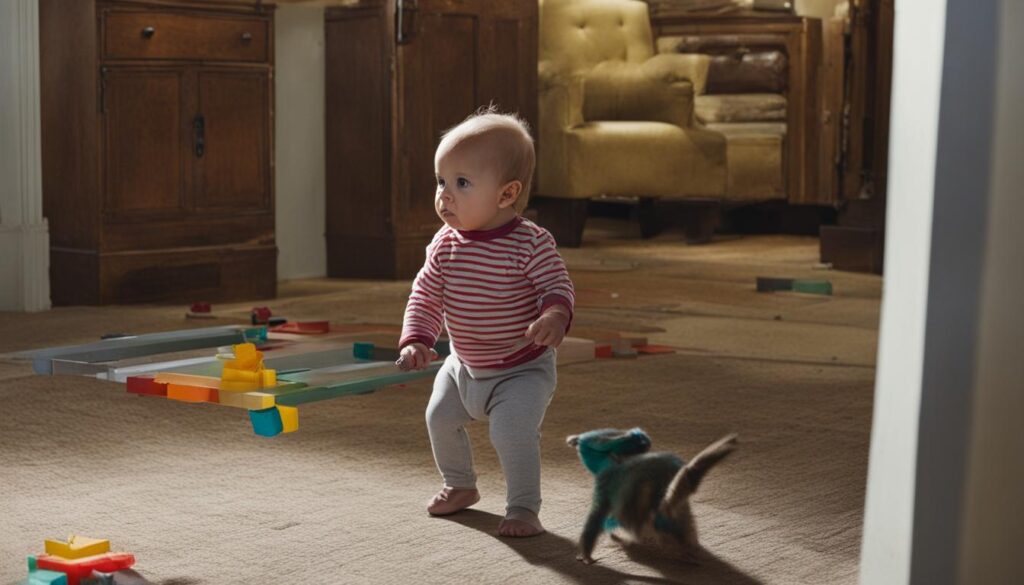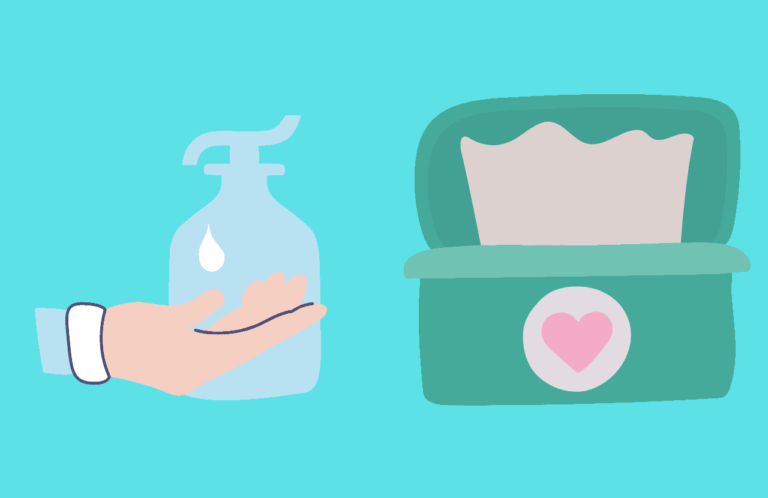Baby Stopped Rolling Over? Here’s Why!
Watching your baby reach new milestones is an exciting experience. From their first smile to their first steps, every achievement is a testament to their development. However, if you’ve noticed that your baby has stopped rolling over, you might be wondering what’s going on. Rest assured, this is a common occurrence in their journey of growth.
Rolling over is an important infant milestone that typically occurs between 4 and 6 months of age. It requires the coordination and strengthening of various muscles, including the legs, neck, back, and arms. But there are several reasons why your baby might temporarily pause this skill.
Key Takeaways:
- It’s common for babies to temporarily stop rolling over at certain stages of their development.
- Rolling over is an important motor skill that develops between 4 and 6 months of age.
- Growth in other areas of development and the focus on new skills can cause temporary pauses in rolling over.
- Strategies like tummy time and providing opportunities for movement can help encourage your baby to resume rolling over.
- Remember that every baby develops at their own pace, and as long as they continue to show progress in other motor skills, there’s usually no cause for concern.
Understanding Infant Motor Skills
Rolling over is an important milestone in your baby’s physical development. Typically, babies start rolling over between 4 and 6 months of age, showcasing their developing motor skills. This skill requires the coordination and strengthening of various muscles in their legs, neck, back, and arms.
One crucial aspect of promoting motor skill development in infants is tummy time. By allowing your baby to spend time on their tummy, you help them strengthen these muscles and gain more control over their movements. Tummy time also aids in the development of head and neck control, which is essential for rolling over.
As babies gradually gain control and strength, they become capable of rolling from their belly to their back and vice versa. This achievement represents their increasing motor skills and physical capabilities.
The Importance of Tummy Time
Tummy time is a crucial activity that supports your baby’s physical development, including the growth of their motor skills. It helps strengthen their neck, back, and core muscles, which are essential for rolling over and other significant milestones.
“Tummy time is like a mini-workout session for your baby, building their strength and coordination.” – Pediatrician Jane Roberts
During tummy time, encourage your baby to lift their head and push up on their forearms. This helps build the necessary muscles and also promotes the development of gross motor skills, such as crawling and sitting.
Developing Coordination and Muscle Control
Rolling over requires not only muscle strength but also coordination. As your baby’s motor skills progress, they learn to coordinate the movements of their legs, arms, neck, and back, allowing them to roll from one position to another.
By providing opportunities for movement and exploration, you can support their development. Encourage your little one to reach for toys and objects while lying on their back, as this helps refine their fine motor skills and contributes to their overall physical development.
Monitoring Baby Milestones
As a parent, it’s essential to monitor your baby’s milestones and celebrate their achievements. Rolling over is just one step in their motor skill development journey. By observing their progress, you can gain insights into their physical capabilities and identify any areas that may require additional support.
Remember that every baby develops at their own pace, and there is a range of normalcy when it comes to reaching milestones. As long as your baby continues to make progress in their motor skills and shows an interest in exploring their environment, there is usually no cause for concern.
Continue to provide a nurturing and stimulating environment that encourages movement and exploration. Celebrate each milestone along the way, and enjoy the process of witnessing your baby’s growth and development.
Reasons for Baby Stopping Rolling Over
It’s not uncommon for babies to experience temporary pauses in their rolling over progress. There are a couple of common reasons why your baby may stop rolling over for a short period.
- Growth and Strengthening of Flexor Muscles: One reason for a temporary halt in rolling over is the growth and strengthening of flexor muscles. As your baby’s muscles develop, they may interfere with their previous rolling technique, leading to a temporary pause in this milestone.
- Focus on Other Areas of Development: Babies go through rapid periods of learning and exploration. During these stages, they may shift their focus to other developmental areas, prioritizing the acquisition of new skills. This shift in attention and effort can cause a temporary pause in rolling over.
It’s important to note that these temporary stops in rolling over are typically a normal part of your baby’s development. However, there are cases where temporary pauses could be a sign of developmental delay or regression in multiple skills. If you notice significant delays or regressions, it’s advisable to consult your pediatrician for further evaluation and guidance.
Remember, every baby develops at their own pace. While it’s natural to have concerns, it’s also important to trust the uniqueness of your baby’s journey.
Strategies to Help Your Baby Roll Over
If your baby has stopped rolling over, there are several strategies you can implement to encourage them to resume this milestone. Prioritizing tummy time, side, and back play, emphasizing free floor time over time in containers, and providing opportunities for movement and exploration can all help in promoting rolling over.
Prioritize Tummy Time
Tummy time is an essential activity for your baby’s physical development. By placing your baby on their tummy and encouraging them to lift their head and push up, you are helping them strengthen their neck, back, and core muscles, which are crucial for rolling over.
Encourage Side Play
Lying on the side can help your baby transition from lying on their back to rolling over. Gently placing them on their side and encouraging them to reach for toys or objects can motivate them to rotate their body and develop the necessary motor skills.
Emphasize Free Floor Time
Avoid confining your baby to containers such as car seats or bouncer chairs for extended periods. Allowing them to freely explore and move on the floor encourages them to practice rolling over and other motor skills.
Provide Opportunities for Movement and Exploration
Engage your baby in activities that stimulate movement and exploration. Placing toys or objects slightly out of reach encourages them to reach, grasp, and twist their body, helping them develop the coordination needed for rolling over.
Seeking guidance from professionals through online resources or courses can also provide valuable insights and tips for promoting your baby’s rolling over milestone. Remember, every baby develops at their own pace, so be patient and supportive during this exciting stage of physical development and baby milestones.
The Timing of Rolling Over
Rolling over is an exciting infant milestone that typically occurs between 4 and 6 months of age. However, it’s important to remember that every baby develops at their own pace, and there is a range of normalcy when it comes to reaching this milestone. Factors such as muscle control, tummy time, and individual temperament can influence the timing of rolling over.
During tummy time, babies strengthen their neck, back, and arm muscles, which are essential for rolling over. As your baby gains more control and strength, they will be able to roll from their belly to their back and vice versa. This gradual development of motor skills contributes to the timeline of rolling over.
Keep in mind that the timeline for rolling over is not fixed, and variations in development are perfectly normal. Some babies may start rolling over earlier, while others may take a little longer. The key is to observe your baby’s progress in their overall motor skills and their ability to reach other milestones.
Factors Affecting the Timing of Rolling Over
Several factors can influence when your baby starts rolling over. Here are some of the key factors to consider:
- Muscle Control: The development and coordination of leg, neck, back, and arm muscles play a significant role in rolling over. As your baby’s muscles continue to strengthen, they will be better equipped to execute this milestone.
- Tummy Time: Regular tummy time sessions help strengthen the muscles needed for rolling over. The more your baby engages in tummy time, the more they will develop the necessary strength and coordination.
- Individual Temperament: Every baby is unique, and their developmental timeline can be influenced by their individual temperament. Some babies may be more eager to explore movement and reach milestones sooner, while others may take a more gradual approach.
Remember, the most important factor is your baby’s overall development and progress. As long as they continue to reach other milestones and show progress in their motor skills, there is typically no need to worry if they haven’t yet started rolling over.
Exploring Other Motor Skills
When your baby stops rolling over, it can be a sign that they are focusing their attention on developing other motor skills. Babies typically work on one skill at a time, and this shift of focus is completely normal. Instead of rolling over, they might be practicing other important skills such as scooting, sitting, or babbling more.
Each baby has their own unique progression and areas of interest when it comes to motor skill development. Some babies may show a particular fascination with reaching and grabbing objects, while others may be more interested in exploring their surroundings by scooting or crawling.
During this phase, you may notice your baby becoming more adept at sitting independently or trying to pull themselves up to a standing position with support. They may also start to experiment with different sounds and babbling as their oral motor skills continue to develop.
Focus on Encouraging Motor Skill Development
As a parent, there are several ways you can help encourage your baby’s motor skill development during this stage:
- Provide a safe and stimulating environment for exploration.
- Offer plenty of floor time and opportunities for play.
- Use age-appropriate toys and objects to encourage reaching, grabbing, and hand-eye coordination.
- Promote tummy time to help strengthen their upper body muscles.
- Offer support and encouragement during sitting practice.
Remember, each baby develops at their own pace, and it’s important to celebrate their unique progress. While some babies may move quickly through various motor milestones, others may take a little longer. As long as your baby is making progress in their overall motor development and reaching other milestones, there is usually no cause for concern.
Safety Considerations

As your baby develops the ability to roll over, it’s important to prioritize their safety. Rolling over opens up new possibilities for exploration, but it also presents new risks. Take these precautions to create a safe environment for your little one:
1. Avoid Leaving Your Baby Unattended on Raised Surfaces
Once your baby starts rolling over, they may surprise you with their first roll when you least expect it. To prevent accidents, avoid leaving your baby unattended on raised flat surfaces such as beds, sofas, or changing tables. Always keep a watchful eye on your little one to ensure their safety.
2. Create a Safe Sleeping Environment
When it comes to sleep, it’s crucial to provide a safe environment for your baby. Place your baby to sleep on their back in a crib or bassinet that meets safety standards. Avoid using pillows, blankets, or any other loose bedding that can increase the risk of suffocation. Opt for a firm mattress with a fitted sheet and keep the crib free from toys or other objects that could pose a suffocation risk.
3. Install Safety Measures
To prevent accidents and injuries, implement safety measures throughout your home. Secure furniture and TVs to the wall to reduce the risk of tipping. Use safety gates to block off staircases and other potentially hazardous areas. Keep small objects and choking hazards out of reach, and cover electrical outlets. These simple precautions can go a long way in ensuring your baby’s safety.
“Safety is not an option. It’s a necessity when it comes to your baby’s well-being.”
Reassurance for Parents
It’s completely natural for parents to have worries and concerns when it comes to their baby’s development. If your little one has stopped rolling over, it’s important to remember that every child progresses at their own pace. Temporary pauses or changes in skill development are part of the normal journey of a baby’s growth.
While rolling over may be an important milestone, it’s crucial to look at your baby’s overall development and engagement in purposeful movement. Babies are constantly exploring and learning new skills, and their focus may shift from one milestone to another. As long as your baby continues to reach other milestones and shows progress in their motor skills, you can rest assured that their development is on track.
“Development is a unique journey for every child. It’s important to embrace the individual pace of your baby’s growth and celebrate the milestones they achieve along the way.”
Remember, there is a wide range of what is considered normal when it comes to baby milestones. As long as your baby is showing progress, engaging in purposeful movement, and exploring their surroundings, there is usually no cause for concern.
Signs of Normal Development
- Continued progression in other motor skills, such as sitting up, crawling, or pulling to stand.
- Exploration and curiosity in their environment.
- Meeting age-appropriate cognitive and social milestones.
- Engaging in purposeful play and exploration of toys and objects.
Enjoy this precious time with your baby and trust in their natural development. If you have any specific concerns or notice significant regression in multiple areas, it’s always best to consult with your pediatrician for personalized guidance and reassurance.
The Connection Between Rolling Over and Walking

Rolling over plays an interesting role in predicting when your baby will start walking. Rolling requires twisting and moving in different directions, which helps develop the torso twisting needed for walking. While sitting requires significant strength, rolling over develops the transitional movements that bring babies closer to walking.
As your baby progresses from rolling over, they will continue to strengthen their muscles and develop the coordination necessary for taking their first steps. So, if your baby temporarily stops rolling over, it’s not necessarily a setback in their overall motor skill development. They may be focusing on practicing other skills that contribute to their journey towards independent walking.
Remember, every baby develops at their own pace and follows their unique path. While rolling over is an important milestone, it’s just one step towards walking. As long as your baby continues to engage in purposeful movement, explore their environment, and reach other developmental milestones, their progress is likely on track.
“The journey from rolling over to walking is full of discovery and growth. Embrace each stage and celebrate every milestone.”
By providing your baby with a nurturing environment that encourages movement and exploration, you are supporting their overall development and helping them become confident and independent walkers in due time. Keep fostering their curiosity, offer opportunities for play and physical activity, and enjoy witnessing their motor skills evolve.
Encouraging Movement and Exploration
Creating an environment that promotes movement and exploration is key to supporting your baby’s development. Engaging in physical activity helps strengthen their gross motor skills, such as crawling, which is an essential milestone.
Encourage your baby to spend time on their tummy, as it helps strengthen their muscles and prepares them for crawling. You can use a soft mat or blanket on the floor to provide a comfortable and safe space for them to explore. Additionally, place toys slightly out of their reach to motivate them to move and crawl towards them.
Remember:
- Allow your baby to explore their surroundings freely under your watchful eye.
- Provide opportunities for them to practice crawling and other forms of locomotion, such as scooting or creeping.
- Engage in interactive play sessions where you encourage them to reach, grab, and manipulate objects.
- Ensure a safe environment by removing any hazards or sharp objects that could cause harm. Baby-proofing your home is essential.
“Physical activity and movement not only enhance your baby’s overall motor skills but also support their cognitive and social development. It’s a crucial part of their growth journey.”
When to Seek Professional Guidance

As a parent, it’s natural to have concerns about your baby’s development. While it’s common for babies to experience temporary pauses or changes in their skill development, it’s important to trust your instincts and seek professional guidance if needed.
If you notice persistent concerns about your baby’s development or significant regression in multiple skills, it’s a good idea to consult your pediatrician. They have the expertise to evaluate your baby’s development, address any potential concerns or delays, and provide reassurance.
Remember, every child develops at their own pace, and seeking professional guidance doesn’t necessarily mean there is a problem. It’s always better to address any concerns early on to ensure your baby has the support they need.
When discussing your concerns with your pediatrician, be sure to provide specific details about your observations and any areas of developmental concern you may have. This will help them accurately assess the situation and provide appropriate guidance.
“Pediatricians are trained to spot developmental concerns and provide the necessary support and interventions. Don’t hesitate to reach out – they are there to help you and your baby.”
In addition to pediatricians, there are other professionals, such as developmental specialists or occupational therapists, who can provide further evaluation and support if needed. They can work alongside your pediatrician to develop a comprehensive plan tailored to your baby’s individual needs.
Remember, seeking professional guidance shows your commitment as a parent to your baby’s well-being. It’s always better to address any concerns or developmental delays early on to give your baby the best possible start in life.
By staying informed, trusting your instincts, and seeking professional guidance when necessary, you can ensure your baby’s developmental journey is supported and nurtured every step of the way.
Enjoying Your Baby’s Journey
As a parent, it’s important to cherish and enjoy every moment of your baby’s development. Each milestone and stage is unique, and your little one will progress at their own pace. By providing a loving and supportive environment, you can nurture their growth and development.
Engaging in play and exploration is key to bonding with your baby and fostering their overall development. Take the time to interact with them, sing songs, read books, and play games that stimulate their senses. Celebrate each milestone, whether it’s their first smile, their first word, or their first steps. These special moments create cherished memories that will last a lifetime.
While you guide your baby through their journey, remember that seeking professional guidance when needed is a sign of strong parental support. If you have concerns about your baby’s development or notice any significant delays, don’t hesitate to consult your pediatrician. They can provide valuable insights and support to ensure your baby reaches their full potential.
Embrace the joy and excitement of watching your little one grow. Your loving presence and active engagement with their development will strengthen the bond between you and your baby. Enjoy this magical journey and celebrate each milestone along the way!
FAQ
Why has my baby stopped rolling over?
It’s common for babies to stop rolling over temporarily as they focus on other areas of development or experience growth in flexor muscles. However, if you notice signs of developmental delay or regression in multiple skills, consult your pediatrician.
How can I encourage my baby to start rolling over again?
You can encourage rolling over by prioritizing tummy, side, and back play, emphasizing free floor time, and providing opportunities for movement and exploration. Seeking guidance from professionals through online resources can also be beneficial.
When do babies typically start rolling over?
Rolling over usually starts between 4 and 6 months of age, but every baby develops at their own pace. Factors such as muscle control, tummy time, and individual temperament can influence the timing of rolling over.
Why is rolling over important for my baby’s development?
Rolling over is an important motor skill that helps develop leg, neck, back, and arm muscles. It also plays a role in predicting when a child will start walking, as it develops torso twisting and transitional movements.
What safety precautions should I take as my baby starts rolling over?
Be cautious about leaving your baby unattended on raised flat surfaces and create a safe sleeping environment to reduce the risk of suffocation. As your baby develops rolling over, they also become more aware of hazards and can move their head to avoid them.
Should I worry if my baby stops rolling over?
Temporary pauses or changes in skill development are usually part of the normal progression. As long as your baby continues to engage in purposeful movement and reaches other milestones, there is usually no need to worry.
How can I encourage my baby’s movement and exploration?
Provide plenty of opportunities for tummy time, floor play, and reaching for objects. Encourage crawling, scooting, and other forms of locomotion to develop gross motor skills while ensuring a safe environment for exploration.
When should I seek professional guidance regarding my baby’s development?
Trust your instincts as a parent. If you have persistent concerns or notice significant regression in multiple skills, consult your pediatrician. They can evaluate your baby’s development and address any potential concerns or delays.
How can I enjoy my baby’s milestones and development?
Cherish each milestone and stage of your baby’s development. Provide a loving and supportive environment, engage in play and exploration, and seek professional guidance when needed to nurture your baby’s growth and development.









